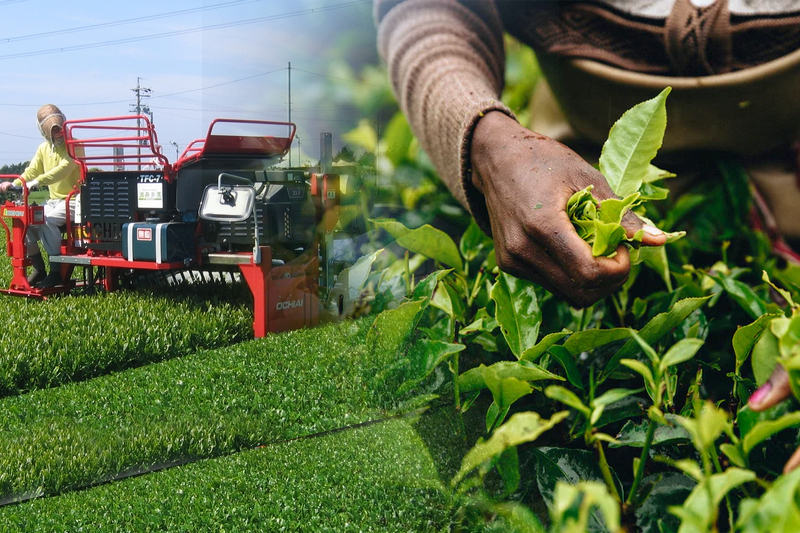
in tea farms, the task force advises using labor and equipment
Kericho , Kenya: A task force comprising multinational corporations and other tea sub-sector stakeholders suggested a 60:40 machine harvesting to hand plucking ratio.
Governor Erick Mutai established the task force in October 2022. According to a task force study released last week, technology in the tea industry will not be wished entirely away. The Kericho county government has been urged to negotiate with large-scale tea growers and other tea sub-sectors to achieve a win-win situation.
The task force was established through a Gazette Notice in October 2022 and was to work for 60 days. In partnership with Nandi and Bomet Counties, it was necessary to conduct a detailed evaluation of multinational tea enterprises and other tea sub-sector in Kericho.
“The task force suggests a 60:40 split between machine harvesting and human plucking. Laws to limit the importation of heavy mechanization (valiant tea harvesting machines) should be established at the national and county government levels,” recommended the task force of 13 members chaired by Captain (Rtd) Richard Too.
The task force observed that practically all large-scale tea farmers and other tea sub-sectors have implemented mechanized tea harvesting in varying amounts, with the majority being completely mechanized.
It was noticed that various types and models of tea harvesting machines, such as sheer harvesters, battery-powered harvesters (hand-held tea harvesters controlled by one person), two-man handled machines (hand-held tea harvesters operated by two people), and self-propelled harvesting machines, were used (valiant model).
It was noticed that the use of machinery in tea harvesting has greatly lowered production costs. “The cost of tea harvesting is maximal (Sh15.32) when done by hand and minimal (Sh4) when done by self-propelled devices” (valiant model). As a result, the use of tea harvesting machinery has greatly lowered production costs,” according to the paper.
Keep Reading
The adoption of tea harvesting machines, however, has resulted in widespread and far-reaching detrimental social and economic impacts among Kericho County citizens.
According to the article, Central Organisation of Trade Unions (Cotu) Secretary General Francis Atwoli stated that tea-harvesting machines were installed due to the union’s excessive demand for wage and salary increases.
A crisis of Humanitarian
Atwoli stated that the tea industry contributes significantly to the Kericho County economy and the livelihood of Kericho citizens.
He urged stakeholders to exercise caution, particularly with employing tea-plucking machines entirely.
He stated that the negotiation over the use and control of tea-plucking machines should be considered a humanitarian issue rather than an economic issue. “The union advocates for 50-50 percent on the usage of machines in tea plucking and hand plucking. The union also urged multinational corporations to accept the recommended proportion to unionize machine operators, who are currently unorganized, according to the newspaper.
According to the report, large-scale tea farmers and other tea sub-sectors continue to pay the Sh1,600 land rates negotiated with the now-defunct County Council of Kipsigis and the Municipal Council of Kericho.
According to the current Valuation Roll (1966), the lawful land rate is Sh264. The Kericho County Government examined the valuation roll, but tea producers, among others, contested it.
The valuation court that was later constituted to hear and decide the matter has never issued its judgment due to the court’s lack of funds.
“The Taskforce found no indication that the LSTPs and other tea sub-sectors have paid, or are paying, any rent to the National Government or at all as planned,” the report findings stated.
The commission was also unable to ascertain the precise land area occupied by the corporations. Title deeds, lease titles, lease agreements, survey plans, maps, and geospatial data for property owned by large-scale tea producers and other tea sub-sectors could not be found or provided. It was suggested that land fees of Sh5,000 to Sh10,000 per acre be imposed and reassessed as needed.
Also Read:- Are there restrictions on foreigners driving their cars in Bali?









